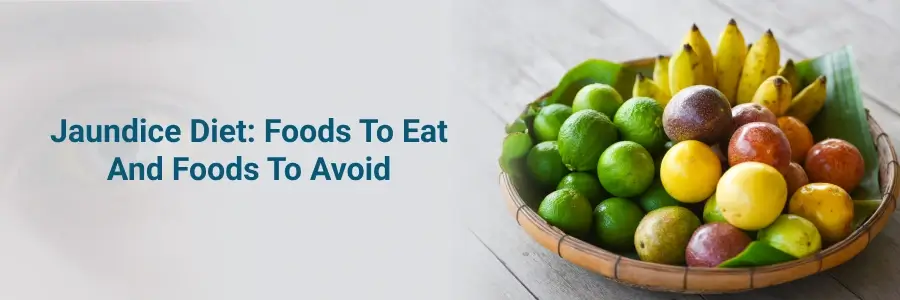- Cardiology 84
- Dermatology 45
- Endocrinology 33
- ENT 16
- Fertility 190
- Gastroenterology 78
- General-Medicine 81
- Gynecology 80
- Hematology 19
- Infectious-Diseases 33
- Neurology 52
- Oncology 34
- Ophthalmology 23
- Orthopedics 69
- Pediatrics 31
- Procedure 23
- Public-Health 144
- Pulmonology 59
- Radiology 8
- Urology 68
- Wellness 161
- Woman-and-child 77

Jaundice Diet: Foods to Include and Avoid
A well-structured jaundice diet chart is crucial for patients to recover effectively. Understanding the right diet for jaundice patients can significantly aid in their recovery process. This guide provides a detailed look at the food to eat in jaundice and the food to avoid during jaundice.
Secure your health with a second opinion. Make informed decisions and book your appointment today!
Get A Second OpinionFoods to Include
Water
Staying hydrated is essential in the diet for jaundice recovery. Consuming at least 2 liters of water daily is recommended. Enhancing water with a teaspoon of fresh lime, lemon, or grape juice can provide additional antioxidants, which are beneficial for liver health.
Fresh Fruits and Vegetables
Incorporating a variety of fresh fruits and vegetables into the jaundice food diet supports liver function. Some excellent choices include:
- Cranberries, Grapes, and Blueberries: Rich in antioxidants.
- Citrus Fruits (Lemons and Limes): High in vitamin C.
- Watermelon and Papaya: Hydrating and nutrient-rich.
- Pumpkin and Tomato: Contain liver-friendly nutrients.
- Sweet Potato, Beetroot, and Carrot: High in vitamins and minerals.
- Garlic and Ginger: Have anti-inflammatory properties.
- Cruciferous Vegetables (Cauliflower, Broccoli, and Brussels Sprouts): Known for their liver detoxifying properties.
- Collard Greens and Spinach: Rich in iron and vitamins.
- Avocado: Contains healthy fats and fiber.
Whole Grains
A whole-grain diet is integral to the diet for jaundice recovery. Whole grains are high in fiber, antioxidants, and essential minerals. Oats, in particular, are rich in beta-glucan, which has been shown to improve liver function with regular consumption over 12 weeks.
Tea and Coffee
In the jaundice food diet, coffee and herbal teas play a significant role due to their high antioxidant content and digestive benefits. Coffee has been proven to reduce the risk of liver disease, cancer, and fibrosis by slowing their progression.
Nuts and Legumes
Nuts and legumes are excellent food for jaundice patients. They are rich in vitamin E, antioxidants, and phenolic acid, and also high in fiber and healthy fats, which help the liver function properly.
Milk Thistle
Milk thistle, an herb rich in antioxidants, contains silymarin, which promotes the repair of damaged liver cells. However, it is advised to consult a doctor before using milk thistle, especially if pregnant or breastfeeding.
Ready to take control of your health journey? Book your appointment now and start your path towards wellness today!
Book an AppointmentFoods to Avoid
Iron
Monitoring iron intake is important in the jaundice diet chart. Iron overload can lead to liver scarring (cirrhosis). Patients should establish their optimal iron consumption to avoid liver disorders.
Fat
Fried foods and those high in fat should be limited or avoided entirely in the diet for jaundice patients. Saturated fats, such as those found in dairy products and meat, are more difficult for the liver to process than unsaturated fats.
Sugar
Refined sugar and other forms of processed sugar should be avoided during jaundice as they can contribute to the accumulation of liver fat. Opt for fruit or low-fat, low-sugar yogurt instead. Limiting artificial sweeteners is also beneficial for reducing liver strain.
Salt
A diet high in salt can cause liver damage. Reducing sodium intake by eliminating processed and canned foods from the diet is crucial in the food to avoid during jaundice.
Alcohol
Alcohol should be completely avoided until jaundice is fully resolved. Alcohol is extremely harmful to the liver and can cause further damage, making it a critical element to exclude in the diet for jaundice patients.
This comprehensive jaundice diet chart serves as a guide to help patients understand the best food for jaundice and the food to avoid during jaundice, promoting a quicker and more effective recovery.
Frequently Asked Questions
Yes, incorporating foods rich in antioxidants such as leafy greens, fruits, and lean proteins can support liver function and aid in jaundice management.
While milk is generally considered beneficial, it's advisable to consume it in moderation during jaundice. Consulting a healthcare professional is recommended.
Opting for fresh fruit juices and hydrating beverages like coconut water can help maintain hydration levels and support liver health during jaundice.
While small amounts of curd can be included in the diet, it's essential to do so in moderation and under the guidance of a healthcare provider to ensure it aligns with the individual's specific condition and dietary needs.

- Cardiology 2132
- Dermatology 168
- Endocrinology 135
- ENT 97
- Fertility 217
- Gastroenterology 232
- General 478
- General-Medicine 1685
- Gynecology 169
- Hematology 85
- Infectious-Diseases 208
- Neurology 207
- Oncology 345
- Ophthalmology 65
- Orthopedics 187
- Pediatrics 83
- Procedure 72
- Public-Health 209
- Pulmonology 126
- Radiology 13
- Second Opinion 311
- Urology 294
- Wellness 600
- Woman-and-child 447
- Others 10217
Related Blogs
If you have any questions, please fill out the enquiry form or call us, and we will get back to you promptly.
040-68334455